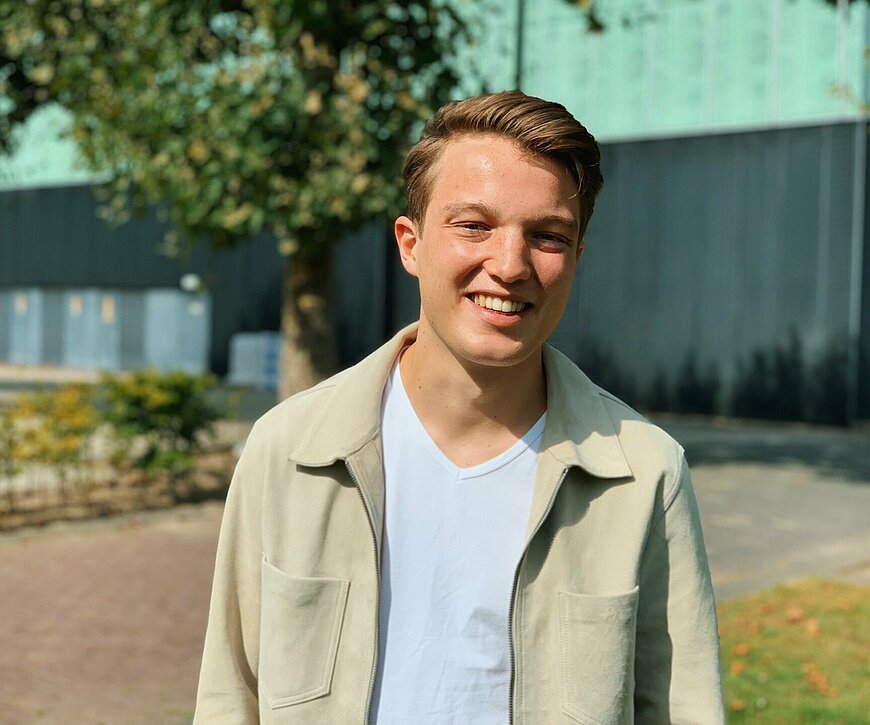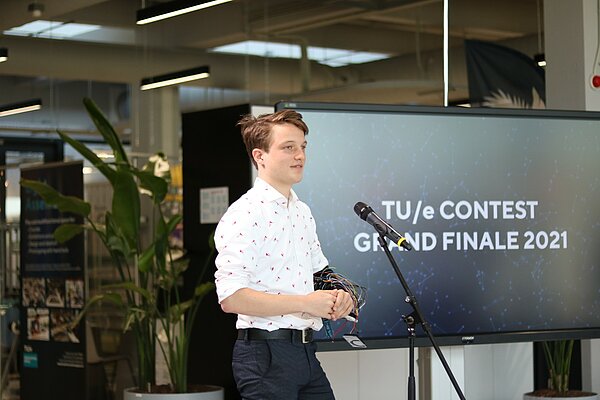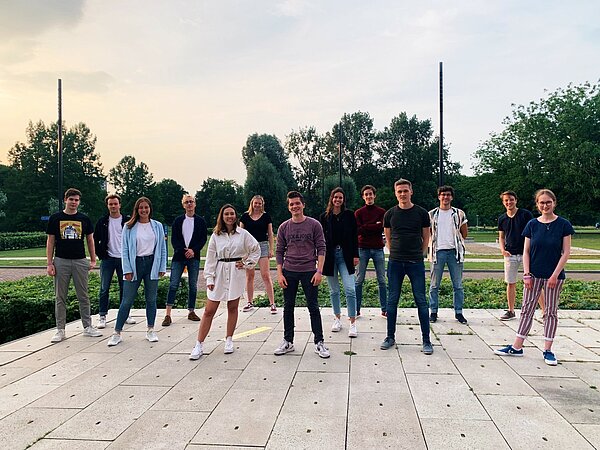Meet our pioneer: Robin van Hoorn

In Brainport Eindhoven we change the world because here we develop key technologies that change society. We can only do that because of our pioneers. So we’d like you to meet one of our pioneers: Robin van Hoorn.
Who are you?
My name is Robin van Hoorn and I’m 22 years old. Originally I come from Lage Zwaluwe.
What do you study?
I started with a bachelor in Computer Science and I’m now doing two masters at TU/e: Data Science & Artificial Intelligence and Innovation Management. In my bachelor, I liked Data Science, but I was also very interested in the organizational side of innovation. So I looked to see if there was anything along those lines to combine. I still don't know if I made the best choice. I’m quite an entrepreneurial person, but I have never worked for a larger company. I enjoy working in new, small projects and companies, partly because you can deal with technical and organizational matters. But if you want to do something like management in a larger company, relevant education is very useful. So by doing a double master I can take that with me and still keep my technical focus.
I have now finished the courses for my master of Innovation Management. This year I’m taking Data Science & Artificial Intelligence courses, after which I will write two theses next year.
Why did you choose this study?
It's nice to look back on it because beforehand I didn't know what I was doing. In high school, I wasn't very motivated to work hard. I did have a preparatory course at the conservatory. I always say that I motivate myself for things that seem interesting to me, like music. I didn't find learning and studying that interesting during my high school period and it all went well for me. I thought the 7’s were good enough. As a result, I was not very interested in looking further into studies. I attended a lot of open days and looked at things like economics, astronomy, physics and econometrics in Leiden and Nijmegen. But I don't know how I got to Computer Science at TU/e. Nevertheless, it turned out very well. Initially, I had registered for a double bachelor, so that I could choose at the last minute, but I deregistered for Mathematics almost immediately.
When I started the first quartile, it was super motivating. I did things I liked to do. Calculus is up to my alley and I also liked logic. Although I surprised myself with this, it went on like this every quartile and I never looked back. It just kept motivating me and in the end, I was in pretty good shape. But when I look back, it's funny that I was hesitating between things like economics and econometrics - so economics and the more mathematical variant - and that I now finally return to the 'business side' in my master Innovation Management.
Why did you choose a double master?
It was quite obvious that I chose the master of Data Science & Artificial Intelligence, and not Computer Science. During my bachelor, I enjoyed the Data Science courses and I also worked part-time for an AI start-up for 1.5 years.
On the other hand, I'm afraid the choice for the Master's in Innovation Management was not very well understood. Six months before the masters were to start, I thought about doing a double master. I then made a list of master's programs that I thought would be fun to do. In principle, you can do any master if you do a premaster for it. Ultimately, Innovation Management seemed the most interesting to me.

Management is one of the most complex things. It’s very underrated among students. About 90% of people think 'I can do that too'. The crazy thing about small businesses is that everyone who starts a small business starts in management. So why do you need a master's degree for it? But it's about getting a better understanding of how structures like that work, how people interact with each other. I specialize in Human Performance Enhancement, which is more the psychological side of Innovation Management. Then you deal with issues such as: how can you motivate large teams to get the most out of themselves?
Based on the same idea, we also set up our student team in a flat structure last year, which generally leads to more intrinsic motivation for the team members for small teams. From my perspective, that is also something I try to use to see what I can contribute to my studies. The things I've had in my courses are very focused on large companies. To put it back into perspective to a small student team is quite difficult, but very interesting.
By talking a lot with others, I finally made the choice to do Innovation Management. This made me realize that I have always found it interesting how large teams work together or how companies make decisions and why it’s complicated. In addition, a double master's degree offers a fantastic prospect for the future. The combination of my two masters is just very good. A lot is going to happen in the field of innovation in AI in the coming years, and I want to be as prepared as possible for that.
Was it logical for you to do your master's at TU/e?
Not necessarily. I went to Eindhoven, partly because I already lived in Brabant and my brother also studied here. So for my bachelor, there was a preference for Eindhoven. I did look a lot at other cities, but Eindhoven was just nice.
I did try to go abroad for my master's degree. I also registered for ETH, University of Zurich, but I didn't get in there. TU/e was my other plan, so that's what it turned out to be.
"A lot is going to happen in the field of innovation in AI in the coming years, and I want to be as prepared as possible for that."
Robin Hoorn
What student team are you in?
I’m co-founder of Team HART, together with Mariia Turchin. It was mostly her idea, but she called me to ask if I wanted to help set up the student team. Then I worked out a few things together with her and Victor Brouwers, and three others. David Eagleman's Ted Talk is of course a key inspiration.

Why did you decide to join a student team?
I was already in an AI start-up in my second year of my bachelor's, as a project of the Honors Academy. There I worked eight hours a week, unpaid. They wanted to pay me, but I refused because that gave me more freedom not to have to work on what they wanted. This allowed me to work on things related to their cool projects, but only the most interesting aspects. This gave me more opportunities to develop myself where I wanted. It was super cool, but I didn't get enough satisfaction out of it anymore. Eight hours a week is just too little to get anything done. I was studying full-time, so I couldn't make more hours.
So once I had more time and Mariia called me, I was immediately excited to take the next step in my studies and start a student team.
What do you love about AI?
The hugely interesting thing is the complexity of tasks that we, as humans, find very easy and that we can solve and automate that. For example, what we try at Team HART is that you can create new senses and that you can subconsciously process the new information you receive. We never actively think about how our senses work, and to us, it comes very naturally. But if you want to recreate it, it becomes very clear that it’s very complex, but also very interesting.
Have you done anything else besides your studies?
In the third year of my studies, I sat on the board of the study association at the Honors Academy, H.S.A. Confluente. It’s quite a small association, with about 200 people a year. The association has just been in existence for six years and is therefore still in a start-up phase. So there’s start-up culture. You are very much figuring things out and setting them up. That's super interesting. It was a great opportunity to continue developing the non-technical side next to my bachelor's degree.
What have you learned from your extracurricular activities?
Above all, I learned what to expect from people, how best to motivate them and give them feedback. So how best to deal with teams. I think it's wonderful to see, especially within student teams, that you can see very clearly what experience people have with working in teams and how they stand in it. To what extent do they prepare meetings or let people find their answers before jumping in. The way of giving feedback is also very interesting. I know a small number of people who are very good at it, who give very constructive feedback. It is a very difficult skill. You don't learn it during your study.
You are very busy. How are you in that?
As nice as it’s, I'm just working 60 hours a week. It's a lot, but I like doing it. I get real satisfaction from it. But at some point, you have to build a good schedule and keep rest. If I continue this to work, then there will come a point that I end up in burnout. Of course, I don't want that. I think it's pretty good to just take a few steps back and see how I can fill my time if I do a little less next to my studies.
"As nice as it’s, I'm just working 60 hours a week. It's a lot, but I like doing it. I get real satisfaction from it."
Robin Hoorn
How aware are you of preventing burnout?
I’m very conscious of it. At one point, the Computer Science academic advisor said that when someone graduates summa cum laude – du s with a 9 average or higher – there are always more. That is never anyone alone. It's a group of friends who push each other so hard that they all get summa cum laude. That's super interesting. But if you get into an environment where people push each other further, there's also a big chance that you'll end up overworked. As the board of the study association of the Honors Academy, we have been very busy with this.
What do you want to do next?
I'm not going to look for a start-up to start. But if an idea comes along, it seems pretty cool to me. It’s super motivating to work on that. You are working 7 days a week, but it’s satisfying. On the other hand, I think it's pretty cool to look at larger companies. For example, I now have a scholarship at ASML. That company has such a hugely unique position that you will not get anywhere else. They have a lot of strategic decisions to make with big teams and they end up making only a few products. It’s absurd to think how much you have to work together for that. To manage that is super interesting.
What do you think about studying and living in Brainport Eindhoven?
I like it here. The best part is that if you want to do something extra, there are thousands of options. What the university allows you to do is huge. You can join a TU/e innovation Space team or a student team, or set it up yourself. You can also join the Honors Academy, sign up for boards and become a student assistant. All those things can give you more depth in what you do. As a student team, you are also very free in what you can do, which is great. There’s also a real start-up culture in Brainport Eindhoven.
"There’s also a real start-up culture in Brainport Eindhoven."
Robin Hoorn
What else would you like to tell (future) students in Brainport Eindhoven?
Do what you like and go for it! I was kind of a selfish person: I mainly looked after myself and I thought money and a high position were very important. But actually, it doesn't matter at all. Just having nice people around you is much more important. Of course, you should do what you like, but it doesn't have to come with great personal gain. At Team HART, we try to find inclusiveness for the whole world, but it doesn't matter if it helps us in the end. If we're still happy, it's fine. You have to find the right balance in that. You don't have to work yourself to death thinking that things will get better later on. I think it should always be a good balance between taking care of yourself and taking care of others.